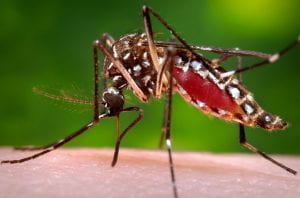Change in mosquito mating may control Zika virus
ITHACA, N.Y. – Genetic cues from male Aedes aegypti mosquitoes passed on during sex affect which genes are turned on or off in a females’ reproductive tract post-mating, including genes related to blood feeding, egg development and immune defense, according to new Cornell research.

The researchers believe such processes provide information that could be exploited to fight mosquito-borne diseases, such as dengue fever, chikungunya and Zika virus.
“We have two main goals,” said Laura Harrington, professor of entomology and a co-author of a paper published Feb. 22 in the Public Library of Science for Neglected Tropical Diseases. “The first is to understand the basic biology of the mosquito mating system, and the second is to try to understand it in a way that we can develop novel strategies for controlling the mosquito. We are focusing on reproduction because we see it as the Achilles heel of the mosquito.”
The research draws from previous findings by molecular biology and genetics professor and study co-author Mariana Wolfner on how Drosophila females’ gene expression, behavior and physiology are changed by mating. That work revealed that after mating, seminal fluid proteins passed from males to females led to changes in gene expression in females and led females to increase egg production, reduce feeding and decrease their likelihood to mate again.
In this study, the researchers used sequencing to identify changes in RNA populations in the lower reproductive tract of female mosquitoes in response to mating. RNA is the chemical messenger by which the information in genes is translated into protein. In the study, the researchers measured changes in the levels of specific RNAs in the female after mating to determine which proteins became more and less abundant. The findings are a step towards understanding what molecules are necessary to prepare a female for producing progeny.
The research team compared RNAs from reproductive tracts from female mosquitoes that had not mated with those that had – immediately after mating, and six and 24 hours afterward.
The results revealed broad changes in the regulation of genes in the female reproductive tract. These affected genes could influence processes related to blood feeding, egg development and immune defense.
The paper provides a foundation for future studies of female mosquito reproduction, according to the researchers. The data are already being used to improve gene information and expression on VectorBase, a National Institute of Allergy and Infectious Diseases resource center for the scientific community.
The researchers hope to uncover a molecule critical for female fertility; scientists could engineer inhibitors of this molecule, that could then be used to block a female’s ability to produce fertile eggs or that prevent eggs from traveling through the oviduct.
“We can either genetically engineer males to not induce this specific molecule, or we can create a smart insecticide that binds with the molecule and makes it inaccessible to the female,” Harrington said. Such a “smart insecticide” could target mosquitoes without affecting other insects, Wolfner added.
This article was written by Melissa Osgood and was originally published by the Cornell Media Relations Office on March 11, 2016.
